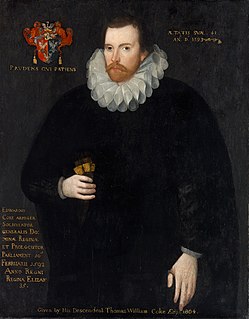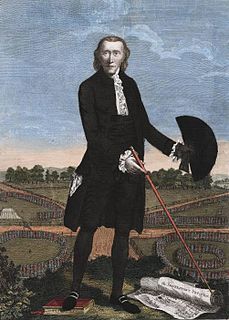See also
| This page lists people with the surname Hostettler. If an internal link intending to refer to a specific person led you to this page, you may wish to change that link by adding the person's given name(s) to the link. |
Hostettler is a surname. Notable people with the surname include:
| This page lists people with the surname Hostettler. If an internal link intending to refer to a specific person led you to this page, you may wish to change that link by adding the person's given name(s) to the link. |

Sir Matthew Hale was an influential English barrister, judge and jurist most noted for his treatise Historia Placitorum Coronæ, or The History of the Pleas of the Crown. Born to a barrister and his wife, who had both died by the time he was 5, Hale was raised by his father's relative, a strict Puritan, and inherited his faith. In 1626 he matriculated at Magdalen Hall, Oxford, intending to become a priest, but after a series of distractions was persuaded to become a barrister like his father thanks to an encounter with a Serjeant-at-Law in a dispute over his estate. On 8 November 1628 he joined Lincoln's Inn, where he was called to the Bar on 17 May 1636. As a barrister, Hale represented a variety of Royalist figures during the prelude and duration of the English Civil War, including Thomas Wentworth and William Laud; it has been hypothesised that Hale was to represent Charles I at his state trial, and conceived the defence Charles used. Despite the Royalist loss, Hale's reputation for integrity and his political neutrality saved him from any repercussions, and under the Commonwealth of England he was made Chairman of the Hale Commission, which investigated law reform. Following the Commission's dissolution, Oliver Cromwell made him a Justice of the Common Pleas.

Sir Edward Coke was an English barrister, judge, and politician who is considered to be the greatest jurist of the Elizabethan and Jacobean eras.

The Petition of Right, passed on 7 June 1628, is an English constitutional document setting out specific individual protections against the state, reportedly of equal value to Magna Carta and the Bill of Rights 1689. It was part of a wider conflict between Parliament and the Stuart monarchy that led to the 1638 to 1651 Wars of the Three Kingdoms, ultimately resolved in the 1688 Glorious Revolution.

Thomas Erskine, 1st Baron Erskine, was a British lawyer and politician. He served as Lord High Chancellor of Great Britain between 1806 and 1807 in the Ministry of All the Talents.

John Bradley Ellsworth is an American politician who was the U.S. Representative for Indiana's 8th congressional district from 2007 to 2011. In 2010, he was the Democratic candidate for a seat in the United States Senate, but he was defeated by Dan Coats, a former Senator, by 55% to 40%.

Brian Douglas Kerns served as a Republican Representative from Indiana's 7th Congressional District from January 3, 2001 to January 3, 2003.
Ada Chard Williams (1875–1900) was a baby farmer who was convicted of strangling to death 21-month-old Selina Ellen Jones in Barnes in London in September 1899.

John Nathan Hostettler is an American politician who served in the United States House of Representatives from January 3, 1995, to January 3, 2007, representing the Indiana's 8th congressional district. He lost his reelection bid for a seventh term to Democratic challenger Brad Ellsworth in the 2006 midterm election, ending a twelve-year congressional career.
Hochstetler is a surname originating in Switzerland, particularly in Bern-Mittelland.

Indiana's 8th congressional district is a congressional district in the U.S. state of Indiana. Based in southwest and west central Indiana, the district is anchored in Evansville and also includes Jasper, Princeton, Terre Haute, Vincennes and Washington.
North Posey Senior High School is a public high school located in Poseyville, Indiana. North Posey is the high school for the MSD of North Posey County, which includes Bethel, Robb, Smith, Harmony, Center and Robinson Townships in Posey County, Indiana.

Sir William Garrow was an English barrister, politician and judge known for his indirect reform of the advocacy system, which helped usher in the adversarial court system used in most common law nations today. He introduced the phrase "presumed innocent until proven guilty", insisting that defendants' accusers and their evidence be thoroughly tested in court. Born to a priest and his wife in Monken Hadley, then in Middlesex, Garrow was educated at his father's school in the village before being apprenticed to Thomas Southouse, an attorney in Cheapside, which preceded a pupillage with Mr. Crompton, a special pleader. A dedicated student of the law, Garrow frequently observed cases at the Old Bailey; as a result Crompton recommended that he become a solicitor or barrister. Garrow joined Lincoln's Inn in November 1778, and was called to the Bar on 27 November 1783. He quickly established himself as a criminal defence counsel, and in February 1793 was made a King's Counsel by HM Government to prosecute cases involving treason and felonies.
Hostetler is a surname of German origin. The name refers to:

The 2010 United States Senate election in Indiana took place on November 2, 2010, alongside 33 other elections to the United States Senate in other states and elections to the United States House of Representatives and various state and local elections to fill Indiana's class III United States Senate seat. Incumbent Democratic U.S. Senator Evan Bayh decided in February 2010 to retire instead of seeking a third term shortly after Republican former U.S. Senator Dan Coats, announced his candidacy for Bayh's contested seat. Bayh's announcement came one day before the filing deadline and no Democratic candidate submitted enough signatures by the deadline to run, so the State Democratic Party chose U.S. Congressman Brad Ellsworth as their nominee. The Libertarian Party nominated YMCA instructor Rebecca Sink-Burris, who had previously run against Evan Bayh in the 1998 United States Senate election in Indiana but with less success than in this election. Coats won the open seat.

The Hale Commission was established by the Commonwealth of England on 30 January 1652 and led by Sir Matthew Hale to investigate law reform. Consisting of eight lawyers and thirteen laymen, the Commission met approximately three times a week and proposed changes as radical as reducing the use of the death penalty, allowing witnesses, legal aid and lawyers for defendants in criminal cases and creating County Courts and a Court of Appeal for criminal cases. Though the Commission was unsuccessful at passing any of its measures under the Rump Parliament, two of its measures were put into law by the subsequent Barebone's Parliament, and, by the middle of the 20th century, most of the others were as well. Debate has occurred over the effectiveness and strife within the Commission between its more moderate and radical members; the general conclusion is that with the sheer volume of work produced and the vast proportion of moderate to radical members, it is unlikely such strife existed.

R v Baillie, also known as the Greenwich Hospital Case, was a 1778 prosecution of Thomas Baillie for criminal libel. The case initiated the legal career of Thomas Erskine. Baillie, the Lieutenant-Governor of the Greenwich Hospital for Seamen, a facility for injured or pensioned off seamen, had noted irregularities and corruption in the hospital, which was formally run by the Earl of Sandwich. After his official reporting of the problems failed to bring about reform in the hospital, Baillie published a pamphlet that was critical of the hospital's officers, alleging that Sandwich had given appointments to pay off political debts; Sandwich ignored the pamphlet but ensured that Baillie was indicted for criminal libel. Baillie hired five barristers, including Erskine, then newly called to the Bar, and appeared before Lord Mansfield in the Court of King's Bench on 23 November 1778.

The Trial of Lord George Gordon for high treason occurred on 5 February 1781 before Lord Mansfield in the Court of King's Bench, as a result of Gordon's role in the eponymously named riots. Gordon, President of the Protestant Association, had led a protest against the Papists Act 1778, a Catholic relief bill. Intending only to hand in a petition to Parliament, Gordon riled the crowd by announcing the postponement of the petition, denouncing Members of Parliament and launching "anti-Catholic harangues". The crowd of protesters fragmented and began looting nearby buildings; by the time the riots had finished a week later, 300 had died, and more property had been damaged than during the entire French Revolution. Gordon was almost immediately arrested, and indicted for levying war against the King.

The trial of Thomas Paine for seditious libel was held on 18 December 1792 in response to his publication of the second part of the Rights of Man. The government of William Pitt, worried by the possibility that the French Revolution might spread to England, had begun suppressing works that espoused radical philosophies.
John Hostettler was an English writer of legal histories and biographies.
Matthew Hostettler is an American politician from the state of Indiana. He serves in the Indiana House of Representatives for District 64. He is a member of the Republican Party.